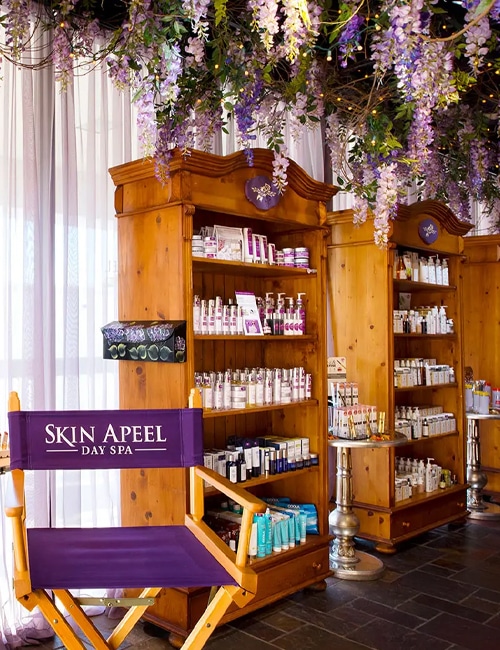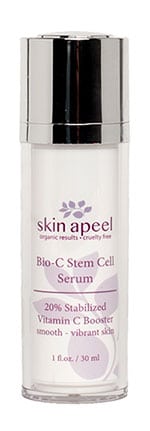Skin Apeel
-
21301 Powerline Road,
Suite 215 Boca Raton, FL 33433 - Phone: (561) 852-8081
- Email: [email protected]

We’d all love to have perfect skin, but thanks to modern lifestyles, peachy, bouncy and plump skin seems unattainable. The main barrier to great skin is the food that we put in our mouths. Most Americans get more than 50 percent of their calories from refined sugar, flour and oil and another 25 percent of calories from animals foods. But while these foods seem like the norm, they are not. Our biology was never designed to process them in the quantities that we eat. Early humans never ate cookies, cake, chocolate bars or anything else both high in sugar and fat.
In recent years, scientists have discovered that many of the nutrients that we eat, like sugar, can have a damaging effect on our skin. Sugar appears to exert a chemical influence on our bodies, called glycation, which causes a buildup of unwanted waste products in our cells. As these processes progress, skin appears less elastic and bouncy and becomes more prone to accumulation of oxidized products under the surface.
Glycation is the chemical term that scientists give to the process of sugar binding with proteins in our bodies. When we eat sugar, it causes the level of glucose in the bloodstream to rise. As blood sugar goes up, the opportunity for sugars to bind with proteins increases, forming unwanted molecules in the process.
These molecules that result from glycation are called “advanced glycation end products” or AGEs. AGEs have been likened to the rust in a car. Just like a car will develop corrosion if exposed to too much water and salt, our cells will experience a buildup of cellular debris in the form of AGEs if we overeat refined sugar. AGEs damage cellular machinery, inhibit the ability of cells to perform basic housekeeping functions and make them behave as if they were much older. AGEs are literally AGE-ing.
It should be pointed out that there is a difference between refined sugar and sugar in whole plant form. Historically, when our ancestors ate sugar, they did so in the form of fruit. Yes, fruit contains sugar, but it also carries with it a host of other constituents which naturally block glycation processes in the body. Because modern diets are low in whole plant food, the chance of glycation occurring is much higher. Cookies, cakes, and biscuits do not contain the phytochemicals which naturally inhibit glycation.
AGEs can result in a host of harmful effects on the body. AGEs can damage the liver, lead to a stiffening of the arteries, reduce energy, lead to nerve pain and cause damage to the skin. Just like car rusts, people with a lot of AGEs in their bloodstreams oxidize from the inside out, damaging cells in the process.
 Skin aging speeds up as excess sugars float in our bloodstream. Harmless fructose and glucose cause a condition called glycation. This occurs when sugars binds to proteins. The proteins then change structure and loose function. Dangerous advanced glycation end products (AGES) collect in kidneys, arteries and the brain. These harmful molecules cause early skin aging. In the lower levels of our skin is our dermis. This structure is mostly made of collagen. Cell turn over is sluggish within the dermis.
Skin aging speeds up as excess sugars float in our bloodstream. Harmless fructose and glucose cause a condition called glycation. This occurs when sugars binds to proteins. The proteins then change structure and loose function. Dangerous advanced glycation end products (AGES) collect in kidneys, arteries and the brain. These harmful molecules cause early skin aging. In the lower levels of our skin is our dermis. This structure is mostly made of collagen. Cell turn over is sluggish within the dermis.
Combined with high glucose makes collagen inflexible. AGE formation then occurs. We’ve set the stage for wrinkles and loss of elasticity. Pro-collagen 111 or baby cushion collagen is pliable and soft. When you pinch a toddler’s skin, you feel the healthy give. After the age of thirty, our bodies no longer produce this vital fiber. It’s huge to do all we can to protect ourselves from glycation. AGE-modified collagen is not a fan of repair. This unruly fiber blocks others from doing their job. As a result, more breakdown and degeneration follows. To add insult to injury, both UV light and AGE formation cause free-radicals. Due to the domino effect of this condition, scientists are on it for solutions.
The glycation process can cause a host of skin problems including fine lines, wrinkles, spots under the skin (not to be confused with zits), inflammatory skin conditions, wrinkles and bags under the eyes.
Glycation does not operate to damage the skin through a single mechanism: instead, it works through a variety of channels to undermine the natural youthful beauty of skin, destroying it at the cellular level. Let’s take a look at some of these channels now.
Every few months or so, your body replaces all of your skin cells with new ones. Old cells wear out, flake off, and need replacing. Glycation, however, can interrupt this renewal process by reducing the ability of the body to create important skin constituents, like collagen. Glycation – because of the damage that it does to capillaries – also prevents new nutrients from being delivered to the site of skin cell production, slowing of the renewal process and making skin appear less vibrant and youthful.
Free radicals are highly reactive chemicals thrown off by metabolic processes. When our cells burn sugar for energy, they do not do so with perfect efficiency. Unburned fuel can sometimes exit the cellular energy powerhouses and react with other tissues in the body, causing damage. The problem with glycation is that it can foster the production of more free radicals by reducing the efficiency with which the cell burns fuel. These byproducts then react with whatever they come into contact with, damaging skin cell membranes, DNA and the ability of cells to repair themselves.
The body creates collagen and elastin to make skin both elastic and bouncy. But while we produce these chemicals in large quantities while we are young, but our ability to do so declines with age. Glycation can accelerate this decline by wreaking havoc on the collagen- and elastin-producing cellular machinery in the skin, making skin sag and wrinkle.
We’d all like to avoid skin glycation if possible, but can it be reversed? The good news is that it can.
Look for a power peptide called Hexapeptide-3 – it promotes restructure and repair. Collagen is the most abundant fiber. So it’s no surprise why it suffers the most from glycation. Hexapeptide-3 can increase hydration 100% in 60 minutes flat. Next up is a dark fruit we know well. Blueberries rank high as they diminish inflammation markers.
This is essential to reducing skin aging. Inflammation is a key factor in overall health too. This dark blue magic packs a mean punch with blocking damage from the sun. Co-Q10 helps fuel repair and regeneration. This fat-soluble co-enzyme says no to oxidation. You know it best from the cut apple left for 5 minutes turning brown.
This break-down is what our bodies fight long and hard all day. Keep you eyes open for pentapeptide-34 trifluoroacetate. This peptide encourages our bodies to produce Co-Q10. Pomegranate is another super fruit that supports us well. Pomegranate counteracts age-related skin thinning. Pure Inventions water enhancers make it tasty to get your daily dose. 12 week studies with these ingredients show the change. Count on softened wrinkles, increased elasticity and a vibrant glow!
The food we eat is one of the primary reasons why so many people suffer premature skin aging. High levels of sugar in the diet lead to AGEs which, in turn, decrease the ability of skin cells to repair and renew.
Healthy diets, low in refined sugar and high in things like beans, greens, fruits, nuts, seeds, and whole grains can put the brakes on glycation, reduce the production of AGEs in the bloodstream, and help to protect skin cells from damage. Many plant foods contain co-factors which prevent the formation of AGEs and promote long-term health.
High levels of fasting blood glucose generate high levels of AGEs. It is one of the reasons why researchers think that people with diabetes have a higher risk of heart disease. Increased fasting blood sugar levels cause damage to blood vessels, increasing the chances of plaque buildup on artery walls.
Exercise, however, can give people better control over the amount of sugar in the blood both during and afterward, reducing the opportunity for AGEs to form.
Anti-glycation supplements are oral treatments which help to reverse glycation in the skin. These supplements often contain a variety of substances borrowed from the plant world that have been shown to have positive, anti-AGE effects in the skin.
It is well known, for instance, that beta-carotenoids – the yellow-orange substance found in carrots, sweet potatoes, and kale – become incorporated into the skin after ingestion and can protect it from UV radiation. Many anti-glycation serums include carotenoids as active ingredients to help bolster the skin’s defenses from the inside.
Anti-glycation supplements also contain potent antioxidants which help to mop up the damaging effect that AGEs have on the ability of cells to burn energy cleanly. A high level of antioxidants in the skin can help to clear away some of the damaging byproducts of cellular metabolism before they can damage surrounding tissue.
Finally, supplements may contain a range of isolated compounds borrowed from nature that have been shown to block the glycation process. Benfotiamine, for instance, regulates blood sugar levels, is anti-inflammatory, and can help directly reduce AGE output.
Finally, anti-glycation serums are topical treatments that aim to reduce and reverse skin glycation from the outside in.
Top anti-glycation serums help to improve collagen synthesis in the lower dermal layers, improve blood flow, reduce signs of wrinkling and generally brighten the skin.
Degeneration can be lessened by reducing sugary foods and refined carbs. Be sure to grab coconut oil or ghee to cook safely. Olive oil and others cause glycation under med-high heat. Topicals mentioned earlier with smart eating works wonders. Glycation doesn’t have to win. For skin aging product and care– contact Skin Apeel Day Spa in Boca Raton. 561-852-8081
















































































